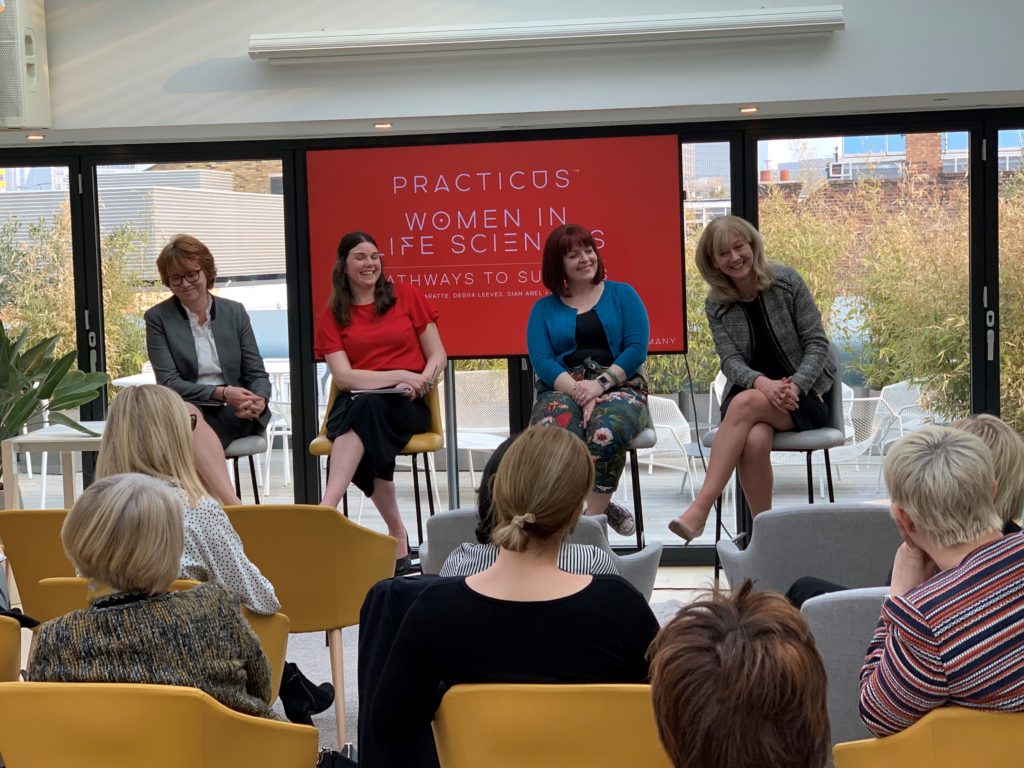Women in Life Sciences: Pathways to Success
Date: Wednesday 17th April 2019
Venue: Fora, 9 Dallington St, London
The purpose of this event was to discuss the current issues surrounding women in Life Sciences and the various ways women can succeed in senior positions.
We were delighted to be joined by our panel:
- Sophie Baratte – CEO, Cellnovo
- Sian Abel – Executive Director, International Human Resources, Vertex Pharmaceuticals
- Debora Leeves – CEO, Vertual
Charlotte Hood, Consultant of Pharmaceuticals & Medical Devices, Practicus. The main topics that came up in our discussion were:
Chair:
- Mentorship and Sponsorship
- Hiring practices
- Being authentic in leadership
- Work/life balance
- Becoming CEO
Please see below a summary of thoughts and insights from both our panel and our audience. Please note, responses have been paraphrased.
MENTORING AND SPONSORSHIP
Mentoring is a valuable tool in supporting women in the industry as it enables them to learn and develop from experienced and respected senior figures, either within their organisation or outside of it. Our panellists discussed the role of mentor and how one can identify these influential individuals.
It is also important to act as a sponsor to female colleagues, leveraging your position within the organisation to advocate for their success. Our panellists offered us their thoughts on the importance of actively championing women, encouraging them to go for opportunities and make their voices heard.
- “Within our company, we encourage our female staff into applying for promotions and trying out different roles. We have to inspire our staff to realise their full potential and help them step out of their comfort zone when trying something different- that’s coaching.”
- “At our company, I’ve seen staff demonstrate many different skills, so it is our role as Managers to encourage women to aim higher. I would say to them: “I’m pretty sure I’ve seen you do the majority of those things on similar projects, so go for it!”
- “One of the things we do in our leadership meetings is champion each other. In our team we currently have 4 women and 8 men, and on the occasion one of my female colleague’s points are overlooked or ignored, I ask the table to acknowledge the point made so that my colleague gets the spotlight brought back onto her. Once again, this brings sponsorship back into the equation and I think that is an important aspect to have in any leadership team.”
- “We noticed that whenever someone would offer a task it was often the women who would volunteer to do it, which in this day and age is still quite shocking. To emphasise this, we say to our male colleagues: ‘I just want to ask you all to acknowledge that only the women have put their hands up to volunteer.’ At least then we had the discussion!”
- “Building confidence within the team and managing expectations is important, it is also worth asking your senior team to enforce mentorship schemes if they don’t already offer them.”
- “As CEO, I have all my staff’s careers at heart and I’m always happy to answer questions, wherever you are in the world. 20 years later you can still give them advice.”
- “It’s important to support the young women coming through. Millennials have had bad press, but they’re very forthright in their views and they are eager to learn, so having the opportunity to coach and mentor millennials and support them in their careers is gold dust. Mentoring young people challenged my way of thinking and challenged my original views for the better.”
- “Speaking as a Millennial, we need to break down the stereotypes and the barriers between the generations. Yes, we may not yet have the expertise, but you do! So please teach me… we want to be inspired and we want to learn!”
HIRING PRACTICES
Many recruitment processes still rely on old fashioned approaches, favouring the ‘safe’ option candidate over (what could be considered) a higher risk candidate. Our panel acknowledge that it is not just about ticking the right boxes when it comes to hiring the right candidate, but also about hiring for potential. Women can be less forthright in ‘selling’ their skills and capabilities, and this must also be a consideration when hiring.
In fact, hiring managers often tend to ‘hire in their own image’. Given the disproportionate representation of males in leadership positions, this perpetuates lack of diversity and stifles development.
- “When recruiting, we are still seeing unconscious bias, so we are continuously trying to improve our company’s diversity targets. We need to be blunt and more direct in exploring the reasons ‘why don’t we have more women in the board room or in senior positions?’”
- “The typical HR profiling grid can be part of the issue for women. The classic criteria generally include self-confidence, extraverted traits. In fact, women with similar or higher levels of competency will usually express more doubts on their abilities.”
- “The traditional hierarchical structure in originations can also be a challenge. Adopting project management as a core principle in driving operations can help, as it allows women to exercise key responsibilities. Project managers usually interact with senior leaders frequently, which offers an alternative route to be seen and heard and enables senior leaders to find their stars!”
- “Leaders hire in their own image with what they consider to be a “tried” and “tested” approach, often choosing experience and reputation over softer qualities that a quieter candidate might emit, but this means not always looking for the right thing.”
- “Unfortunately, we go towards the loud voice in the room and as we continue to choose ‘security’ over ‘risk’ in the final selection you tend to find yourself with the same type of candidates, this needs to change we need to embrace diversity better.”
- “I think the paradigm is shifting slightly. When I am hiring I am looking for potential, learning agility and attitude. I am not always trying to tick boxes, I’m trying to get to know the person. I want to know how they will behave on a daily basis; can they learn new skills, can they fit into the culture of the organisation? It’s about shifting away from tried and tested and that’s why I guide my leaders to look at potential, it’s where we will truly find diversity.”
- “It is true however, that the industry is operating in more and more challenging and uncertain times. Within these times, there is an understandable inclination to hire for certainty, safety and security. It’s a sensitive juggling act.”
AUTHENTIC LEADERSHIP
In a male dominated workplace, there is a tendency for women in senior positions to try to be more ‘masculine’, to mirror the qualities of their male colleagues. Our panel emphasised that authenticity is key:
- “We’re women, clearly we’ve been successful, and you find more women trying to be ‘men’. I’m proud to say I’m quite feminine, I don’t think we should be shy about that. I don’t like to see aggressive behaviours but I will challenge my business leaders if I feel my voice is not being heard, it’s about being authentic, be yourself!”
- An audience member stated that she has been criticised for coming across as too aggressive in the workplace. Our panel responded “What I would try and do is tone down the aggression but still be authentic. I have also come across as being too aggressive to match the man in the room. Realistically we need to be more confident that what we are doing is saying something of value, that’s the art of communication.”
- “It’s about having these uncomfortable conversations, we shouldn’t be shy in talking about it. Unconscious bias is more pervasive. At work, I want to be feminine, we don’t need to use aggressive behaviours to get our point across. It’s about challenging stereotypes and sometimes it does feel too bold, but we as women shouldn’t be too shy.”
- “When I was starting out, my role model was male and over time you find your style. I wasn’t aggressive and loud, I was analytical and understood the numbers- you don’t have to be something else to be CEO, just be yourself. You will find what you’re good at and what works for you.”
WORK/LIFE BALANCE
The panel were asked how easy it is for women to obtain a ‘work-life balance’ and juggle family, home life and work responsibilities.
- “I didn’t work for eight years during the period where I had my children. Before this, I’d always been a career woman, and now I’m CEO. The answer is you can always resurrect your career. You could do consultancy or portfolio work. It’s up to the business to make it easy for those that want to come back.”
- “After a break, you may have to play catch up but that just makes you more determined. You don’t have to come back full time, there are lots of different ways.”
- “Having a family was important to me. I fell pregnant on an ex-pat assignment in Switzerland. I started talking about returning even before I left, to really set the intention. I built in-touch points, e.g. I WILL be at that sales conference in December!”
- “Coming back to work in my company, well it might look like a halfway house 2-3 days a week… we will work with you as we want you to come back. If the child’s ill, go home and look after them, this applies to fathers too!”
- “There is some flexibility now in terms of working. But seeing stress and getting people to open up is a problem. We need to be more open on the stress side of things.”
- “A male leader mentioned he had to pick his kids up after work in front of everybody. I think this was good. We need more visible from male leadership like this. After all, women do it every day!”
BECOMING CEO
Of course, perhaps one of the most key questions for aspiring leaders was advice on getting to the top and removing the obstacles on the path.
- “You must network! People need to know who you are! If you don’t get on those shortlists it is impossible. Always be thinking about your next role, what skills do you need for that role and how can I gain those skills? I did a finance qualification, so people know I have the right skills and knowledge to run a business.”
- “I started putting myself forward for different areas. I started doing budgets and working closer with the CEO, I was always thinking about my next role and what skills that role needs – and then you must put yourself forward! As CEO, you tend to get approached rather than apply for positions. Don’t be afraid to aim high!”
- “You always come up against challenges on the way up and at the top but you’ll either win or lose, you’ve got to give it a go. It’s tough when you try your best and it didn’t work. The challenge is that everyone expects the CEO to have the answer, ultimately you must keep on smiling.”
A massive thank you to our wonderful panel and to our audience for attending this event.
Look out for the next one coming soon!
About Practicus
Practicus provides problem solving and recruitment. To find out more about the company, see here





0 Comments